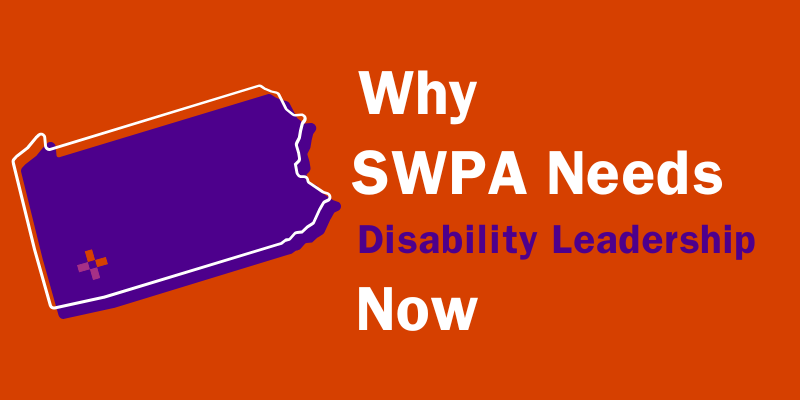
Why SWPA Needs Disability Leadership Now
Southwestern Pennsylvania knows how to reinvent itself. We’ve transformed from a steel powerhouse to a region fueled by tech, health care, and innovation. But even as we celebrate these advances, too many of our neighbors are still locked out of the rooms where critical decisions are made.
As Regional Director for Disability Lead Southwestern Pennsylvania (SWPA), I’ve spent the past several months listening to people across our region – civic leaders, funders, business partners, and above all, individuals with disabilities. One message comes through loud and clear:
Accessibility alone won’t get us where we need to go. True progress means ensuring disabled people are a part of the conversations and decisions shaping the future – whether that’s in boardrooms, on commissions, in public office, or anywhere else influence is wielded.
This is not only an issue of civil rights, it’s an issue of economic growth, civic vitality, and justice.
It’s also about belonging. Too often, people with disabilities are expected to adapt to systems that don’t accommodate various experiences or needs. Creating spaces where everyone is included and their voices are heard is possible and can happen when we bring fresh perspectives into spaces of power and influence. True leadership doesn’t have to wait for a title or permission; it can begin with an idea, a question, or the courage to challenge the status quo. This is where Disability Lead comes in, we communicate the impact of people with disabilities and develop and connect emerging and established leaders to real opportunities to transform how decisions are made.
Nearly one million working-age Pennsylvanians live with disabilities – according to a study conducted by Unlock Access on behalf of Disability Lead assessing the feasibility of penetrating the SWPA market and strategic planning. In Allegheny County, adults with disabilities are disproportionately affected by poverty – highlighting the need for more inclusive economic pathways and leadership in creating solutions.
The employment data tells a stark story. In Pennsylvania:
+ 52% of people with cognitive disabilities are not employed.
+ 67.5% of those with ambulatory disabilities are not working.
+ Nearly half of working-age individuals with disabilities are outside the labor force entirely.
These figures aren’t a measure of people’s talent or ambition. Instead, they highlight opportunities where systems and structures can improve in recognizing disabled people as leaders and decision-makers.
We often hear about diversity and inclusion in corporate and civic life. But our survey conducted by Unlock Access showed that only about 4% of Pittsburgh-area organizations explicitly identify disability leadership as part of their workforce or board development strategies. That’s a missed opportunity, and an opportunity for growth.
Too often, disability gets framed as a shortcoming. In reality, it’s part of the richness of human diversity – and frequently fuels creativity, problem-solving, and resilience. When disabled leaders are empowered, entire communities feel the benefits. Diverse teams make wiser decisions. Civic institutions earn more public trust. And our economy gains access to talent that has long been overlooked.
Disability Lead exists to change this dynamic. We don’t just talk about inclusion and accessibility. We invest in leaders with disabilities who want to make an impact by connecting them to the resources they need to succeed and opportunities that align with their leadership goals. Our model is proven with disabled leaders in Chicago; now, we’re expanding nationally by launching a chapter right here in Southwestern Pennsylvania. The SWPA chapter was shaped by insights from more than 100 local community members who joined our listening sessions in 2024.
In the months ahead, we’ll be recruiting our inaugural cohort of emerging leaders with disabilities in Southwestern Pennsylvania, building cross-sector partnerships across business, non-profit, and civic spaces, and lifting up the voices and stories of regional changemakers. Thanks to visionary partners like the FISA Foundation, The Heinz Endowment, and the Staunton Farm Foundation, we’re launching with real momentum – and with deep commitment to doing this work with, not for, our community.
These emerging leaders aren’t waiting to be helped. They’re ready to lead, and to contribute their vision and expertise to business, government, philanthropy, and civic life.
But we can’t do it alone.
If you serve on a board, consider recruiting disabled members. If you’re in human resources, examine how you identify and nurture disabled talent for leadership pipelines. Whether you are a philanthropist, journalist, educator, or elected official – we all have a role to play. We need to move away from seeing disability as something to “solve,” and start recognizing it as a perspective that strengthens every conversation, every decision, and every institution.
We have a chance to make Southwestern Pennsylvania a model for the nation, a region where disabled people are seen, supported, and seated at every table where decisions are made.



.jpg)